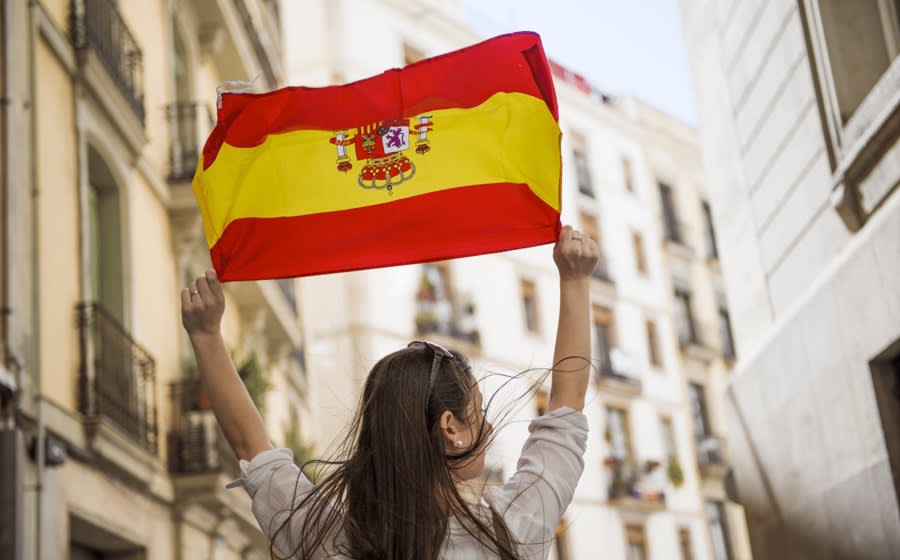The accurate way to call People from Spain and Why
September 14, 2022
Win a FREE Trip to Spain!
Exciting Announcement! For the first time, we're thrilled to offer exclusive trips to the heart of Spain - an experience like no other. This isn't your typical tourist journey; it's a unique opportunity to immerse yourself in authentic Spanish culture, alongside real locals and our passionate team.
But there's more! Simply by requesting information about this amazing trip, you'll be entered into a special draw to win a Fully Paid Trip to Spain for Two. And that's not all - everyone who inquires will receive an exclusive bonus gift, valued at $500, available only now.
Ready to Discover the Real Spain?Click Here ↑ to Request Information & Enter the Draw!
If we were called Spainadians, it wouldn’t roll off the tongue nicely. Everyone thinks there’s only ONE correct way to call people from Spain, but there’s actually TWO!
I know you don’t want to fall into confusion like other people always do by calling us Latinos, Mexicans, or anything related. - Not that we find it offensive, but it’s simply not the truth. I’m sure everyone deserves to be called what they really are.
So… I got you! This is how people from Spain are called, the differences between our most common demonyms, and a table showing the real names of people from Spain by region.
And if you love languages, I may have saved something for you at the end :) So let’s get into business!
Table of Contents ▼ ▶
1. How are People from Spain called?
The correct way to call People from Spain is Spanish or Spaniard. That’s it. You got it! Not Latino or whatever else you had thought. Spanish or Spaniard refers to anyone born in Spain (any region) or who has origins from there.
2 . The Difference Between Spanish and Spaniards
You can call us how you prefer! But why use 2 different terms then?
It’s simple. The term Spaniard is used as a noun referring to individuals ONLY. It literally means a person from Spain.
The difference between both terms is that Spanish has different uses:
- It can be an adjective for places or “Spanish things.”
- Also can be used as a collective noun referring to a person from Spain.
- The language: Spanish is a romance language that comes from Latin. Also, the official spoken language in Spain and in many other different countries. So… the term “Spanish” refers to the language as well.
I’ve heard that in the US, they refer to all Spanish-speaking people as “Spanish,” and that’s not correct. Not all people who speak the Spanish language were born -or have origins- in Spain. This is basically why the term Spaniard came up! To avoid any misunderstandings and make it straightforward for everyone.
An explanation for dummies 101
If you are like me and need some easy-to-digest info, this is for you:
- If you refer to an individual: Both Spaniard and Spanish are okay!
- If you refer to a place or anything that is not a person: Use the term Spanish only!
- If you refer to the language: Only the Spanish term is correct!
3. How Spanish People are called in all 50 provinces
Now it’s time for spicing things up with some local names! Spanish people have different names according to their region (And feel very identified with it, by the way). There’s a solid nationalist regionalism In Spain.
Knowing what Spanish People are called in all 50 provinces can help you blend with the locals and understand Spanish culture better!
| Province | Spanish Demonym | English Demonym* |
|---|---|---|
| Álava | Alavés, -esa | Alavanian |
| Albacete | Albaceteño, -ña | Albacetenian |
| Alicante | Alicantino, -na | Alicantinan |
| Almería | Almeriense | Almeriensen |
| Asturias | Asturiano, -na | Asturian |
| Ávila | Abulense | Abulensen |
| Badajoz | Badajocense | Badajocensen |
| Barcelona | Barcelonés, -esa | Barcelonesse |
| Burgos | Burgalés, -esa | Burgalese |
| Cáceres | Cacereño, -ña | Cacerenian |
| Cádiz | Gaditano, -na | Caditanian |
| Cantabria | Cántabro, -a | Cantabrian |
| Castellón | Castellonense | Castelonian |
| Ciudad Real | Ciudadrealeño, -a | Ciudadrealenian |
| Córdoba | Cordobés, -esa | Cordobanian |
| Cuenca | Conquense | Cuencan |
| Gerona | Gerundense | Geronian |
| Granada | Granadino, -na | Granadian |
| Guadalajara | Guadalajareño, -ña | Guadalajarian |
| Guipúzcoa | Guipuzcoano, -na | Giupuzcan |
| Huelva | Huelveño, -ña | Huelvenian |
| Huesca | Oscense | Oscensian |
| Islas Baleares | Balear | Balearian |
| Jaén | Jaenero, -ra | Jaenerian |
| La Coruña | Coruñés, -esa | Corunian |
| La Rioja | Riojano, -na | Riojanian |
| Las Palmas | Palmense | Palmensian |
| León | Leonés, -esa | Leonesian |
| Lérida | Leridano, -na | Leridian |
| Lugo | Lucense | Lucencian |
| Madrid | Madrileño, -ña | Madrilenian |
| Málaga | Malagueño, ña | Malaganian |
| Murcia | Murciano, -na | Murcian |
| Navarra | Navarro, -rra | Navarran |
| Orense | Orensano, -na | Orensian |
| Palencia | Palentino, -na | Palencian |
| Pontevedra | Pontevedrés, -esa, | Pontevedrian |
| Salamanca | Salamanquino, -na | Salamancan |
| Santa Cruz de Tenerife | Santacrucero, -ra | Santacrucerian |
| Segovia | Segoviano, -na | Segovian |
| Sevilla | Sevillano, -na | Sevillian |
| Soria | Soriano, -na | Sorian |
| Tarragona | Tarraconense | Tarragonian |
| Teruel | Turolense | Teruelian |
| Toledo | Toledano, -na | Toledanian |
| Valencia | Valenciano, -na | Valencian |
| Valladolid | Vallisoletano, -na | Valladolidian |
| Vizcaya | Vizcaíno, -na | Vizcainan |
| Zamora | Zamorano | Zamoranian |
| Zaragoza | Zaragozano, -na | Zaragozanian |
*Disclaimer: The English translation is literally how I believe it’s supposed to be said. I mean, it’s hard to get an accurate translation from all regions since the demonyms were adapted from our own language. This is the most precise way I’ve found until now.
Let me know in the comments how you’d say it! :)
4. How Spanish People are called in 30 languages
Tons of languages are spoken in the whole world! I’m showing you on this list how Spanish people are called in 30 different languages. In case you’re a sucker for languages or want to expand your knowledge, add word counts to your vocabulary!
| Language | How are Spanish People Called |
|---|---|
| Mandarin Chinese | 西班牙语 |
| Hindi | स्पैनिश |
| Spanish | Español / Española |
| English | Spanish / Spaniard |
| Arabic | الأسبانية |
| Portuguese | Espanhol |
| Bengali | স্পেনীয় |
| Russian | испанский |
| Japanese | スペイン語 |
| German | Spanisch |
| Punjabi | ਸਪੇਨੀ |
| Javanese | Spanyol |
| Korean | 스페인의 |
| Vietnamese | người Tây Ban Nha |
| Telugu | స్పానిష్ |
| Dutch | Spaans |
| Sweedish | Spanksa |
| French | Espagnol |
| Greek | Ισπανικά |
| Italian | Spagnolo |
| Turkish | İspanyol |
| Persian | اسپانیایی |
| Finnish | espanjalainen |
| Polish | hiszpański |
| Ukrainian | Іспанська |
| Irish | Spainnis |
| Hawaiian | kepania |
| Slovenian | španski |
| Indonesian | orang Spanyol |
| Thai | ชาวสเปน |
Next time you refer to someone from Spain, you know the correct way to call them is Spaniard or Spanish, and it’s a plus if you know their home city demonym. Trust me, you’ll make an excellent first impression.
Spaniards will be surprised and grateful to know you’re interested in their culture. Spanish people have the warmest, most open and most friendly personalities in Europe. Meeting new people and sharing their traditions and culture is one of their favorite activities!












